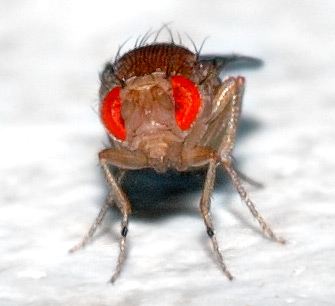It's the Homer Simpson dilemma - is it more important to eat or to sleep? If mammals are deprived of sleep, then they want to eat more to help stay awake, and being deprived of food, through starvation, keeps them awake - presumably to search for more food. But we don't know a lot about how this is controlled. Obviously, we need to strike the balance with enough of both, though you can combine them - I had a dream I was eating a giant marshmallow, and when I woke up my pillow had vanished!
 Anyway, now researchers in the US have uncovered some of the genes that control this balance in fruit flies, which may shed light on our own patterns of eating and sleeping.
Anyway, now researchers in the US have uncovered some of the genes that control this balance in fruit flies, which may shed light on our own patterns of eating and sleeping.
This is work from Alex Keene and his colleagues, published this week in the journal Current Biology. They've been looking at the sleeping and feeding cycles of tiny fruit flies, known as Drosophila. These are quite a handy model organism for this kind of study, as we know a lot about their daily rhythms, known as circadian rhythms.
The scientists discovered that starving fruit flies had a powerful effect on keeping them awake, the same as in mammals. And given that fruit flies share a lot of genes with humans and other mammals, this suggests that we might be able to unpick the genetic connections between sleeping and feeding using these little flies.
The scientists scanned through 2,000 genes in the flies, and found over a dozen that were involved in sleeping and feeding. Then they narrowed down their search to just two, called Clock and Cycle, which are also involved in flies' daily rhythms - they're also involved in daily rhythms in mammals, including humans. To find out more about the role of these genes, they looked at flies both with and without each gene, under starvation conditions, to find out how much they slept.
But how can you tell if a fly is sleeping or not? Well, the researchers monitored the flies' movements - if a fly isn't moving regularly, it's a pretty good bet it's asleep.
The scientists discovered that flies missing the Clock and Cycle genes had a three to four-fold reduction in sleep when they were starved, compared with genetically normal flies. This tells us that both the genes play an important role in helping the flies to sleep under starvation conditions, and probably help to co-ordinate the choice between sleeping and eating at any given time.
Because the clock and cycle genes are also found in humans, and have very similar roles, it may be that these genes also help us to co-ordinate eating and sleeping too. So further research with mammalian models and human cells might shed light on how to treat sleep disorders and metabolic and eating problems. But at the moment, this is just speculation, and more work needs to be done.










Comments
Add a comment